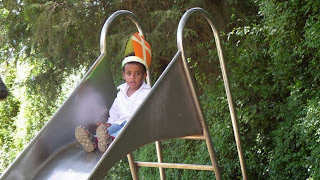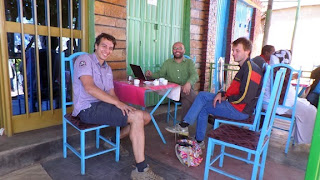It didn’t
look like Christmas at all, today, December 25th!
Apart from the flowers in our garden, that is.
Robert went to work and I had the carpenter to
instruct about where to bore holes to hang Rob’s pots with Geraniums, make tea
for them (The carpenter and his assistant are making a small chest and and
make the curtains for the dining room.
But first of all I had to store the kilos of Ethiopian Kái Wott (the base
for a lovely sauce) that Beletech made for
me. She made a whole bucket of it and it didn’t fit in the freezer
compartment. The wott consists of 10
kilo’s onions (mashed), 4 kilos of tomatoes (mashed) and this toghether cooks
for a whole day until ¼ of its volume. Then you add Berbere, a dry spice made
from lots of hot red pepper, dried, garlic, ginger, an Ethiopian spice that I
don’t know, both the black and white variety. Beletech took me yesterday to the
‘mill’ where they ground the mixture into the red powder called Berbere. It was
an adventure in itself, waiting in the line of women, each bringing a bIg sack
(or two) with their particular homemade mixture.
Any way, when I completed the curtains around
15:00 I went to the GYM around the corner to rehabilitate my body (I am
growing ‘vadsig’ – a good Dutch word for being not fit and a bit overweight in
the wrong places). I am so happy to have a Gym around the corner!
Now I am
listening to beautiful Christmas music (Cantique de Noel, sung by Jose Carreras) and
it – finally - gives me the
Christmas feeling. Rob and I had a simple
Christmas dinner: leftover spaghetti
with a sauce of stewed beef, cabbage and berbere. With new curtains, made of traditional handwoven cotton, that turned out quite all right.
Then we recalled all the Christmases we
celebrated during the past 35 years, where and with whom, in Nigeria and England (with Lindsay and Jeremy) in Hawaii
with ‘the extended family’, in Canada, with Bart and Megan and Megans family, in Burkina Faso with Marjan and Frank, in Liberia
with Roberts' parents and mine! In Jordan with Rob’s mum and her friend Sanne,
In the Netherlands in Son with my family
and in Renkum with Meike’s Hawaiian friends. Good memories, all of them! We also thought of you, our friends and family now celebrating Christmas somewhere in the world. May light shine upon you.
And
suddenly this evening there was internet connection again. So I managed to
talk to Bart, Roberts’ brother in Canada. Even though it was short, it was good
to be in touch. Megan’s mum died last week, and somehow we are more connected than usual.
…Man will
live for everymore… because of Christmas day…

































